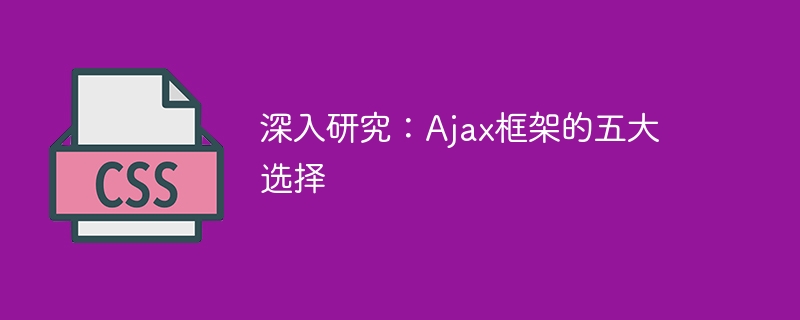Home >Web Front-end >CSS Tutorial >Five excellent candidates for Ajax frameworks
Five excellent candidates for Ajax frameworks
- WBOYWBOYWBOYWBOYWBOYWBOYWBOYWBOYWBOYWBOYWBOYWBOYWBOriginal
- 2024-01-26 08:10:07965browse

Deep Study: Top Five Choices for Ajax Frameworks, Specific Code Examples Required
Introduction:
In modern Web development, Ajax (Asynchronous JavaScript and XML) has became an integral part. It can realize asynchronous data interaction and provide users with a faster and smoother experience. In order to better develop and manage Ajax requests, developers usually choose to use some mature Ajax frameworks. This article will conduct an in-depth study and comparison of five common Ajax frameworks and give specific code examples.
1. jQuery Ajax:
jQuery is one of the most popular and widely used JavaScript libraries. It simplifies JavaScript programming and encapsulates a series of cross-browser compatible APIs. jQuery Ajax provides a set of convenient and easy-to-use methods for sending and processing Ajax requests.
The sample code is as follows:
$.ajax({
url: 'example.php',
type: 'POST',
data: { name: 'John', age: 30 },
dataType: 'json',
success: function(response) {
console.log(response);
},
error: function(xhr, status, error) {
console.log(status + ': ' + error);
}
}); 2. Axios:
Axios is an excellent Promise-based HTTP client library, which can be used in browsers and Node.js environments. Axios provides rich functionality and extensible configuration options, supporting various request methods and interceptors.
The sample code is as follows:
axios.post('example.php', { name: 'John', age: 30 })
.then(function(response) {
console.log(response.data);
})
.catch(function(error) {
console.log(error);
});3. Fetch API:
Fetch API is a modern network request API built into the browser. Compared with the traditional XMLHttpRequest, it is simpler to use. Clear, and supports Promise.
The sample code is as follows:
fetch('example.php', {
method: 'POST',
body: JSON.stringify({ name: 'John', age: 30 }),
headers: {
'Content-Type': 'application/json'
}
})
.then(function(response) {
return response.json();
})
.then(function(data) {
console.log(data);
})
.catch(function(error) {
console.log(error);
}); 4. Vue.js:
Vue.js is a lightweight JavaScript framework that focuses on building user interfaces. It provides the Vue.prototype.$ajax method to send Ajax requests, making it more convenient to develop Vue applications.
The sample code is as follows:
new Vue({
methods: {
fetchData: function() {
this.$ajax.post('example.php', { name: 'John', age: 30 })
.then(function(response) {
console.log(response.data);
})
.catch(function(error) {
console.log(error);
});
}
}
}); 5. AngularJS:
AngularJS is a powerful JavaScript framework for building web applications. It has built-in $http service, which can be used to send Ajax requests.
The sample code is as follows:
$http({
method: 'POST',
url: 'example.php',
data: { name: 'John', age: 30 }
})
.then(function(response) {
console.log(response.data);
})
.catch(function(error) {
console.log(error);
});Conclusion:
The above is an in-depth study and code examples of the five common Ajax frameworks. Each framework has its own unique characteristics and advantages. When choosing an Ajax framework, you need to consider it based on the specific needs of the project and the technical background of the developer. I hope this article can provide some reference and help for developers when using the Ajax framework.
The above is the detailed content of Five excellent candidates for Ajax frameworks. For more information, please follow other related articles on the PHP Chinese website!

